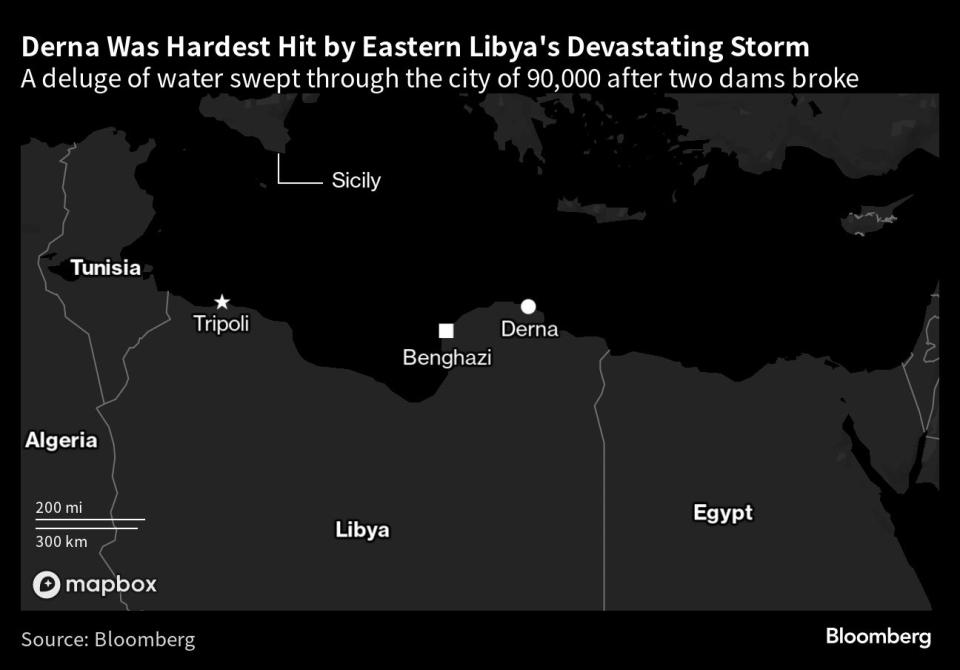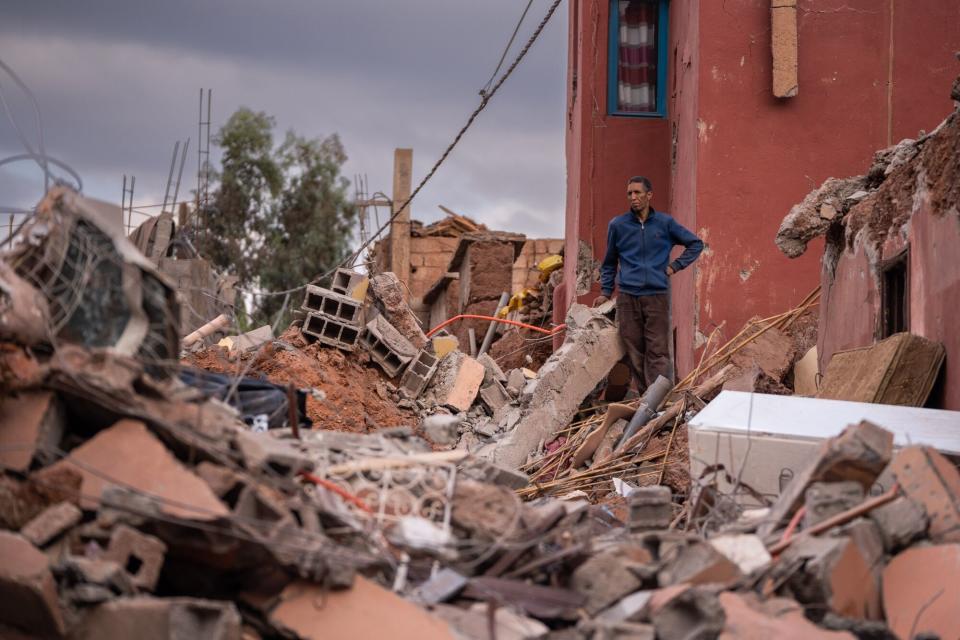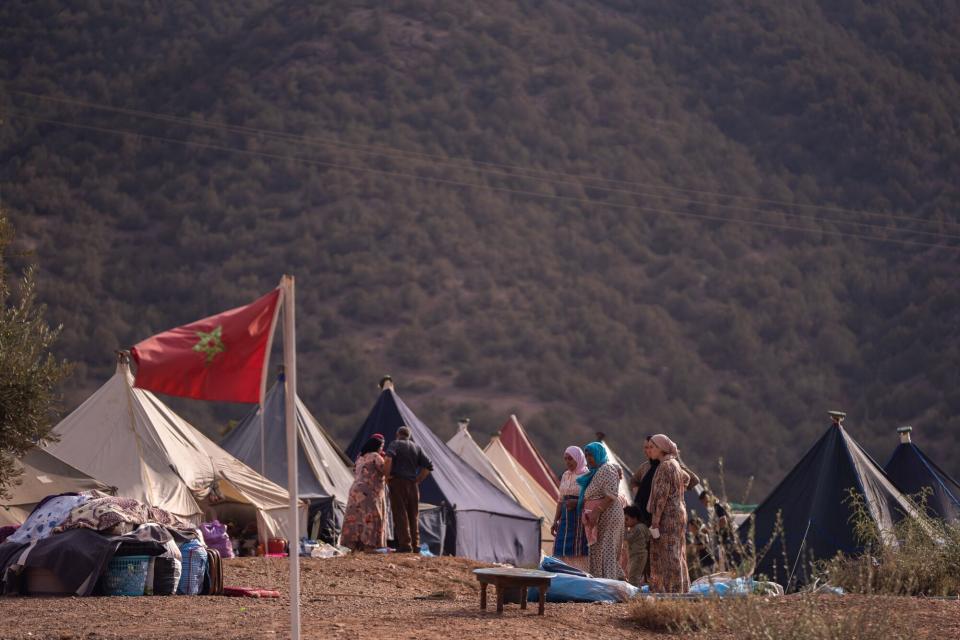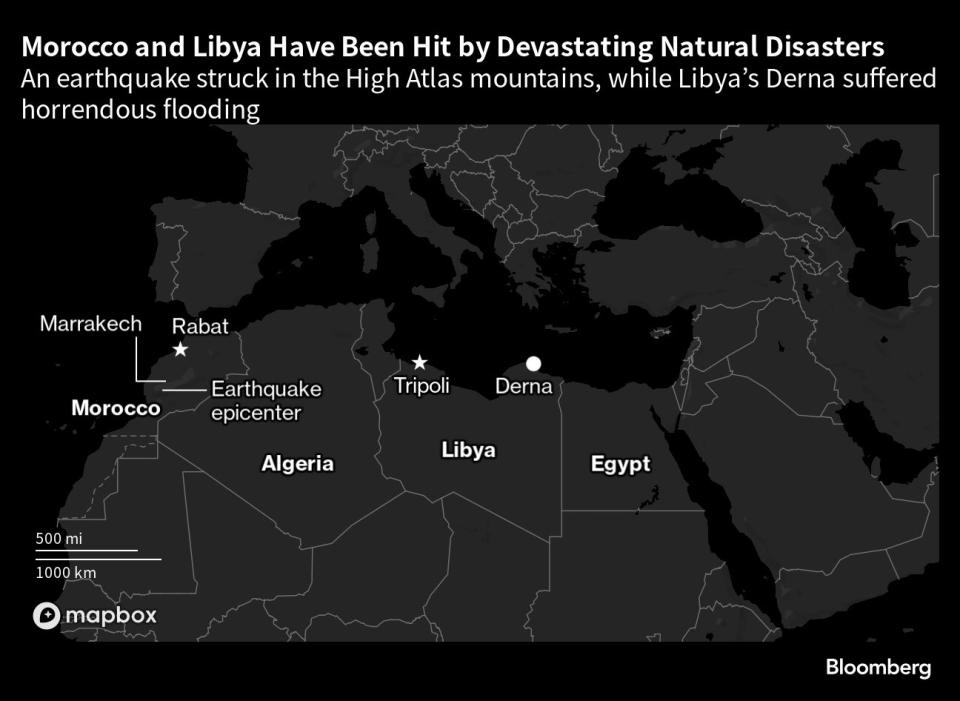Death Toll From Libya Floods, Morocco Quake Hits 8,000 as Politics Slows Aid
- Oops!Something went wrong.Please try again later.
(Bloomberg) -- About 8,000 people have died and thousands more are injured or missing in the disasters that struck the two North African nations of Morocco and Libya within days of each other. Aid efforts are being hampered by political complications.
Most Read from Bloomberg
China Sows Fresh Confusion About Apple With Security Remarks
Luxury Cruise Ship Full of Australians Stuck in Greenland Arctic
From $1 Billion to Almost Worthless: FaZe Clan Runs Out of Hype
In Libya, 5,000 people have died after the Mediterranean storm Daniel ravaged the nation’s northeastern coast over the weekend. Hardest hit was Derna, a city of 90,000, where entire neighborhoods were washed away in the deluge of water from two burst dams. Officials in the eastern part of the divided OPEC nation said water levels had reached the fourth or fifth floors of some buildings. The search is continuing for an estimated 10,000 missing people.
Morocco Hasn’t Accepted French Aid - and Macron Isn’t Happy
In Morocco, the most powerful earthquake in a century on Sept. 8 killed about 3,000 people and injured 5,530 more. The focus is now turning to rehousing the survivors and rebuilding. Former central bank director Abdelouahed El Jai told Bloomberg the latter may cost between 30 billion dirhams ($3 billion) and 50 billion dirhams.
“North Africa is facing another humanitarian disaster,” Jacques Nel, a Cape Town-based analyst for Oxford Economics, wrote in a note.
Aid and rescue efforts in the two countries have been made more difficult by political complications. In Libya, the affected region is run by one of the country’s two governments, which is at odds with the administration in Tripoli. The Moroccan government, for its part, has been selective, accepting aid from Spain, the UK, Qatar and the Emirates, while snubbing offers from the US, former colonial ruler France and several other countries.
Libya’s Situation
In a sign of some convergence after the tragedy, Libya’s rival governments pledged two billion Libyan dinars ($414 million) in assistance to Derna and other areas affected in the east.
Neighboring Egypt dispatched its military chief of staff and other officers, along with relief supplies, while Algeria sent in its interior and health ministers, along with rescue workers, according to Arab state media.
Libya’s situation “is the very definition of a disaster,” Othman Abdel-Jaleel, health minister for Libya’s east, said in a clip carried by Al Masar TV. “The corpses are still scattered” in various hospitals awaiting identification.
The Libyan National Army said Tuesday that 25%-45% of Derna had disappeared, according to Arab satellite channel Arabiya.
The scale of the disaster owes much to the long-running political division. Rival administrations mean the country, despite its oil wealth, has suffered a dearth of investment in infrastructure and social services, especially in the east. While the disaster has seemingly brought the two sides together, it may not last, some observers said.
“Relief efforts will be hamstrung by competition between Libya’s two governments – the Benghazi government has no money, and the one in Tripoli will try to capitalise on the disaster,” Nel said.
Anger Rises
Meanwhile, in Morocco, survivors in devastated villages in remote areas around the High Atlas mountains vented anger over the perceived slowness of domestic rescue efforts and aid supplies.
The displeasure comes against the backdrop of the government’s seeming reluctance to accept assistance from France, a move that drew a sharp rebuke from Emmanuel Macron. The French president released a video late last night on “controversies that shouldn’t exist” between Rabat and Paris, and repeated that France was ready to send aid.
Tensions have flared up between the two countries after Macron sought closer ties with Morocco’s arch rival Algeria. Morocco has kept the post of ambassador to Paris vacant for months.
Separately, Morocco’s King Mohammed VI visited earthquake victims in Marrakech, marking a rare appearance that cast a spotlight on the monarch’s prolonged absences from public life. The king spoke to some of the wounded at the university hospital in the country’s tourist hot spot and donated blood, state television reported on Tuesday evening.
The 60-year-old was overseas when the disaster hit. Though he returned swiftly, it was a reminder to Moroccans of the long stretches he spends outside the country.
The monarch’s visit came as hopes fade of finding more survivors.
--With assistance from Michael Gunn, Ania Nussbaum, Samy Adghirni and Julius Domoney.
Most Read from Bloomberg Businessweek
How Sam Bankman-Fried’s Elite Parents Enabled His Crypto Empire
ADHD Drug Shortages Worsen as Makers Say Production Is Maxed Out
James Dolan’s $2.3 Billion Sphere Is Raising Eyebrows—in a Good Way
©2023 Bloomberg L.P.





